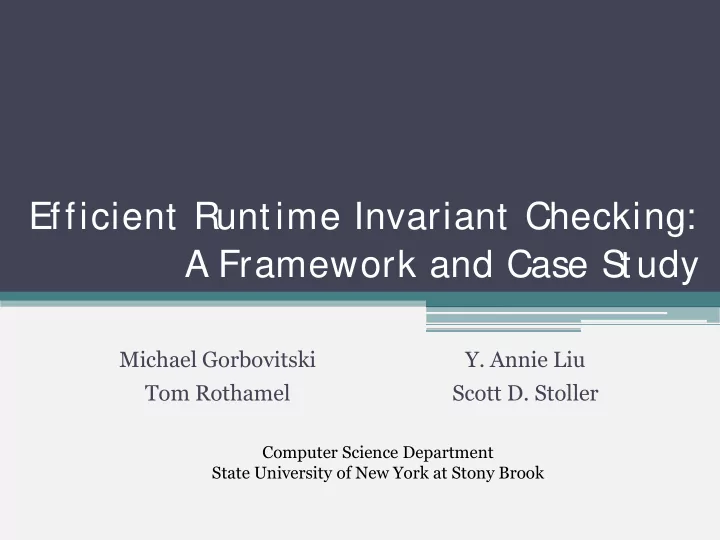

Efficient Runtime Invariant Checking: A Framework and Case S tudy Michael Gorbovitski Y. Annie Liu Tom Rothamel Scott D. Stoller Computer Science Department State University of New York at Stony Brook
Invariants An invariant is a predicate that is expected to be true at all points during program execution Important for correctness and optimization • Predicates about the program state: e.g. no node has itself as a child foreach (o in extent (Node): o in o.children): report ("Error: ", o, " has a self-edge.") stop () • Predicates about the history of program states: no new command is sent while a command is still executing 2
Runtime Invariant Checking Checks invariants during program execution i.e. checks predicates at all program execution points + Can check any invariant - Has runtime overhead, especially high if complex invariants are checked naively 3
Our Framework S upports foreach (query): action recording history • Specifying invariants using high-level queries ▫ Invariant : query result is non-empty ▫ Recording history data for use in queries • Analysis and transformations for efficient checking ▫ Incremental computation of query results ▫ Static alias analysis and type analysis • Mechanism for triggering actions for reporting errors, debugging, and prevention or remediation 4
Related Work • Runtime invariant verification Behavioral specification languages Spec#/Boogie [Barnett06] , JML [Leavens05] /jmlc [Cheon03],… not incremental for our queries, less expressive, or both Logic specification languages Jnuke [Artho04] , EAGLE [Barringer04], … queries over sequences of events, not data structures • Incremental query result maintenance JQL [Willis06], JQL Incremental Maintenance [Willis08],… less expressive, e.g. no membership tests on nested objects and sets. • AOP AOP[Kiczales01] – manually writing pointcuts and advices 5
Outline • The problem, framework, related work • Specification of invariants using queries • Efficient m aintenance of query results • Implementation and experiments 6
S pecification of Invariants using Queries Query foreach (sp in $sending_packets, kt in extent (KerberosTicket): kt.invalid and kt.ip==sp.target_ip): Action report ("S ending ", sp, " with invalid ticket!") stop () de in global : $sending_packets=set() at $x.send($p): if type ($x)==socket: do before : Recording $sending_packets.add($p) history do after : $sending_packets.remove($p) 7
Incremental Maintenance of Query Results foreach (query): action • For every kind of update to the query’s underlying sets and objects: generate program transformation rule that specifies how to incrementally update the query result • For updates to the query’s underlying sets and objects actually in the subject program: apply rules to incrementally maintain the query result static analysis reduces number of runtime checks • When a new element is added to the query result, run the action 8
Generating Program Transformation Rules foreach (query): action foreach ( sp in $sending_packets, Query kt in extent(KerberosTicket): kt.invalid and kt.ip==sp.target_ip): action for sp in $sending_packets: Naive checking for kt in extent(KerberosTicket): if kt.ip==sp.target_ip: code if kt.invalid : action 9
Generating Program Transformation Rules for sp in $sending_packets: 1. Eliminate loops over for kt in extent(KerberosTicket): the updated sets if kt.ip==sp.target_ip : 2. Use auxiliary maps to if kt.invalid: replace loops/tests over action sets that are joined with the updated sets with lookups at $sending_packets.add($sp) : 3. Leave remaining tests for $k in revmapK[$sp.target_ip]: mapS2K[$sp].add($k) if $sp not in $sending_packets : 4. Update auxiliary maps for $k in mapS2K[$sp]: when necessary if $k.invalid: action 10
May-Alias Analysis – For Update Detection • Only insert maintenance code at places where query results could be affected • Compute pairs of variables and fields that may alias each other. ▫ If not aliased to data that the query depends on, cannot affect results • Uses and extends [Goyal05] • Interprocedural, object-oriented, flow-sensitive, derivation context-sensitive • Time complexity : O (n 3 ) 11
Type Analysis – For Precise Update Detection • Do not insert maintenance code at places where query results cannot be affected • Infer types of all expressions statically ▫ If the type of expression is different than type of anything in the query, cannot affect results • Type analysis ▫ distinguishes between constants, etc ▫ supports union types, e.g. union(int(1), int(2)) • Time complexity : O (n ä s) 12
Implementation • Checks invariants in Python programs ▫ 5000 lines of Python code ▫ Takes seconds to generate rules ▫ Applied to programs up to 80KLOC • InvTS – the engine that applies generated transformation rules to subject programs ▫ 18000 lines of Python code ▫ Takes tens of seconds to apply rules ▫ Applied to programs up to 80KLOC 13
Experiments – Checking Invariants • AST Transformations performed by InvTS – inputs from 493 to 15955 AST nodes ▫ Not own child – no node has itself as a child ▫ Not shared child – no two nodes have the same child • Authentication performed by Python Samba client ▫ Require valid ticket – no packets sent with an invalid ticket ▫ Repeated authentication – no gratuitous reauthentication • File distribution protocol (BitTorrent) ▫ No duplicate data – no unneeded duplication of data ▫ No packets changed in transit – md5 of payload unchanged 14
Experiments – Runtime Overhead of Invariant Checking 15 Non-incremental versions take more than 20 min vs. 1/2 min for “No check”
Experiments – Benefits of S tatic Analysis 16
Conclusion • An efficient runtime invariant checking framework ▫ Incrementally maintaining query results drastically reduces overhead of runtime invariant checking ▫ Deriving rules from queries allows the programmer to declaratively specify invariants using queries ▫ Type and alias analysis provide significant further reduction of overhead in our experiments • Other recent and on-going work ▫ InvTS, Python and C program transformation system Generating optimized implementations, instrumentation, ... ▫ Efficient query-based debugging [S CAM’ 08] ▫ More general incrementalization technique [GPCE’ 08] 17
Recommend
More recommend